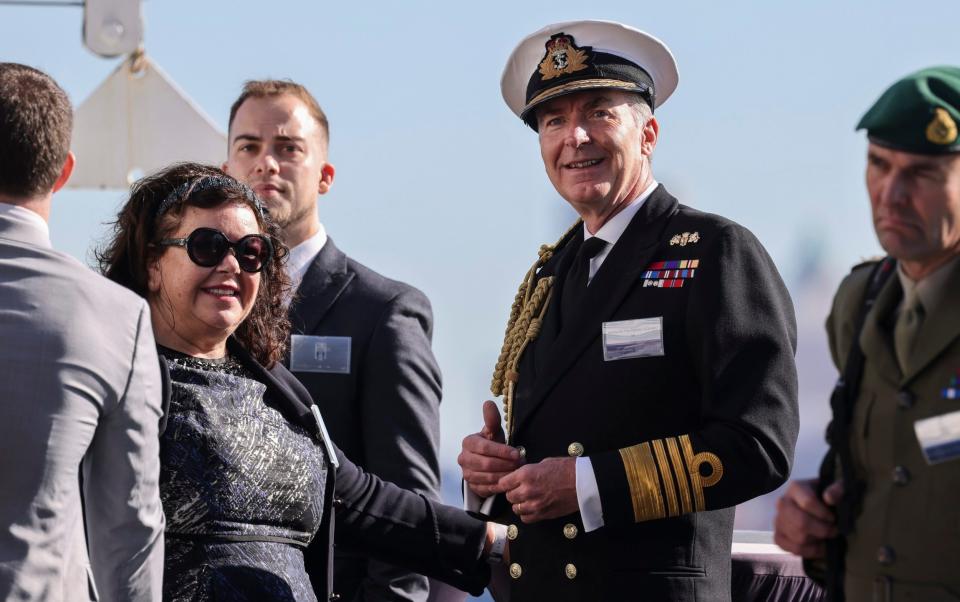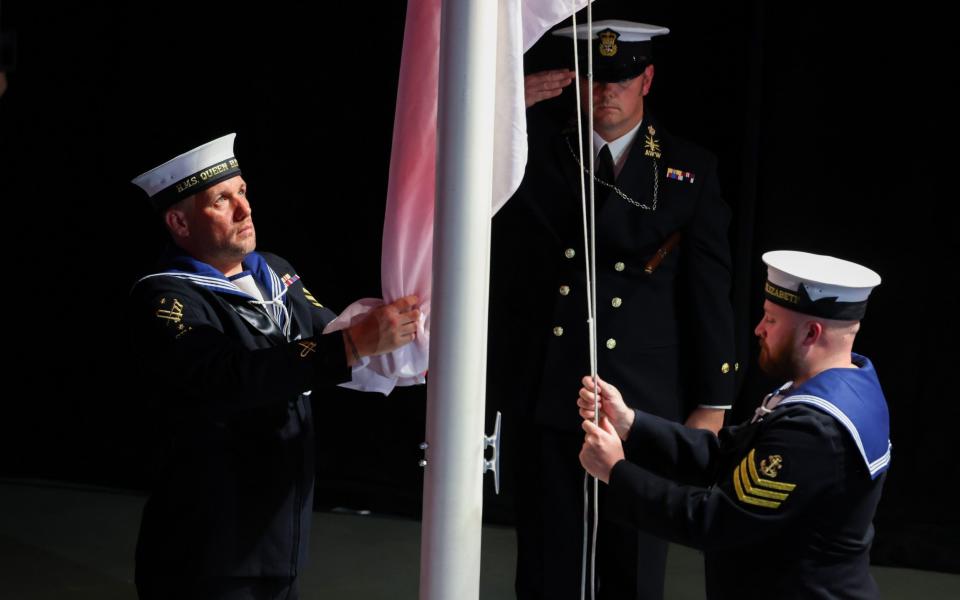Russia could carry out attacks in space, warns British Armed Forces head Tony Radakin

Russia could wage war in space against the West, the head of the Armed Forces has warned.
Admiral Sir Tony Radakin cautioned that Russia could “disrupt” domains away from the traditional land warfare seen in Ukraine, including both sub surface and in the skies.
“It has capabilities in space,” Sir Tony said. “We saw an example of that at the tail end of last year, when Russia exploded an object in space which created immense debris. Russia has nuclear capabilities, Russia has underwater capabilities.”
The Chief of the Defence Staff made the comments after President Putin was accused of sabotaging Nord Stream 1 and 2 pipelines with undersea explosions that caused four leaks and “unprecedented” damage.
Although Sir Tony refused to blame Russia while an investigation into the explosions was ongoing, he warned: “Russia has the ability to disrupt in other areas in addition to what it’s doing in Ukraine, what it’s doing in energy and what it’s doing in these diplomatic and information battles.”
Russia has significant anti-satellite capabilities, and last November tested a ground-based missile that brought down one of its own satellites some 300 miles above the earth. In 2020 Moscow was accused by the UK and US of firing a missile in space with the characteristics of a weapon.
Prof Malcolm Chalmers, deputy director general of the Royal United Services Institute think tank, said that if Russia were to destroy satellites the impact would be felt “throughout the world”.
“Russia could also attack the GPS systems which play a key role, both military and civilian, throughout the world,” he said. “There could be some disruption to civilian services, such as sat-nav systems used in most of our phones and cars.”
He noted that similar to the sabotage of pipelines, the destruction of satellites involves “neither direct casualties nor an attack on another country’s territory,” and is therefore less likely to provoke a direct Western military response.

However, Sir Tony insisted if Russia did attack critical national infrastructure, either in underwater sea cables - of which over 95 per cent of the world’s information is circulated - or in space, it would provoke a strong response from Nato nations.
Sir Tony insisted that despite the multitude of threats from Russia the UK “should have the confidence that our lives will be safe and secure, our economies will be protected and we should have the resolve, sometimes we might have to take some short term pressures but we are going to overcome the pressure that Russia is trying to impose on our lives”.
In an interview with The Telegraph on board HMS Queen Elizabeth at the Atlantic Future Forum in New York, Sir Tony welcomed the Government’s recent commitment to increase defence spending to three per cent of GDP by 2030.
He added that the current “mood music” was to spend more on defending critical national infrastructure. He also cited the Royal Navy’s recent procurement of a ship dedicated to that role as an example of how UK defence wishes “to get down deeper to both monitor and be able to tackle some of the threats that exist in the deep ocean with those cables”.
Earlier this month Mr Putin warned that he was not bluffing on the use of nuclear weapons when he ordered partial mobilisation of 300,000 reservists in a desperate bid to turn the war in Ukraine in his favour.
Sir Tony gave short shrift to the mobilisation, dismissing the notion that an army created through conscription could succeed, questioning how this could be an “effective fighting force against a Ukrainian army that is fighting with all the spirit and determination and confidence when they are fighting for their land, for their futures, and some of these conscripts from Russia don’t even know where they are going, what they are fighting for”.
For all of Mr Putin’s rhetoric, Sir Tony insisted that “Russia does not want a nuclear war”.
“Russia does not want a war with Nato,” he said. “Russia doesn’t want to strengthen the international resolve even more strongly than it already is because that creates even bigger problems for Russia in the here and now.”

He cited the diplomatic response seen since Russia invaded Ukraine in February, with the majority of western nations “deploring” Mr Putin’s behaviour. “Countries are adjusting their energy policies so that they buy less energy from Russia this year and they will look to wean themselves off Russian energy in future years,” he said. “That’s important because the battle lines are not just on the physical territory in Ukraine.”
Sir Tony said Nato countries showing a united front was a huge incentive for the people of Ukraine.
“When the world comes together … that helps these brave people in Ukraine fight for their country,” he said, adding that it also means “President Putin’s ambitions will fail and that is why you are seeing the weakness in the Russian plans and how they are being defeated”.
While much has been made of Mr Putin’s “deranged” mindset, Sir Tony was more cautious: “He is behaving in a rational way for President Putin, rather than an irrational actor”. He said Mr Putin’s behaviour was “not totally random and reckless”.
“He is constrained in what he can do because of the way we can respond and the way Ukraine is fighting and he doesn’t want to strengthen the international resolve,” he said, adding: “He’s at a point of weakness.”
This “weakness” comes from Russia having been “defeated in its ambition” with how it foresaw its “special operation unfolding. Instead, Sir Tony reels off Mr Putin’s failures since the invasion, including its inability to take key Ukrainian cities, having been “ejected off” Snake Island and had its capital ship, Moskva, sunk in the Black Sea. “Those are impactful defeats on Russia,” he said.
Whilst the conflict in Ukraine continues to worry Sir Tony – he describes it as a “despicable, horrible war” – he takes some level of comfort from the fact that Russia is clearly “failing in its objectives in Ukraine” and has not succeeded in having the West “cower” to them.
Asked if he felt cautiously optimistic about the trajectory of the war in Ukraine, Sir Tony said that he did. “That’s a product of seeing how Ukraine responded at the very outset, seeing the calamitous way that Russia has prosecuted this war, seeing the international response, seeing the way that Ukraine has been able to shift its tactics.”

 money
money 